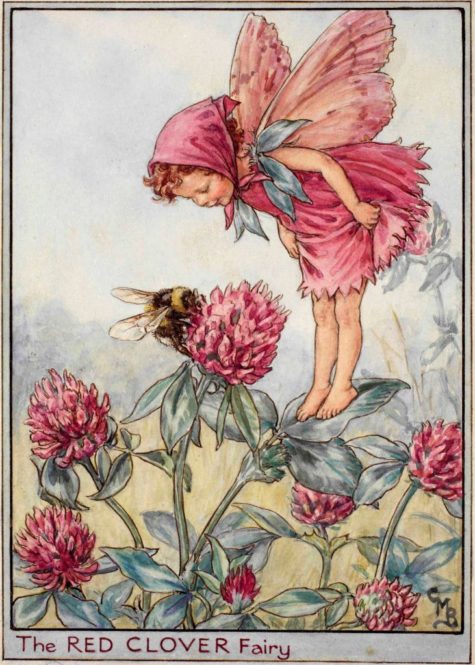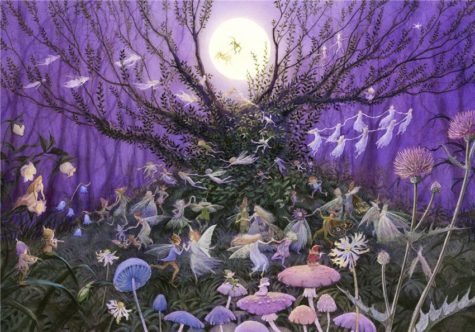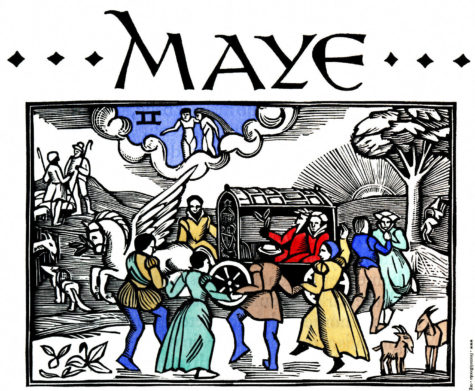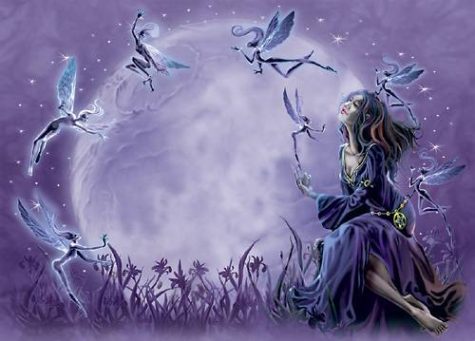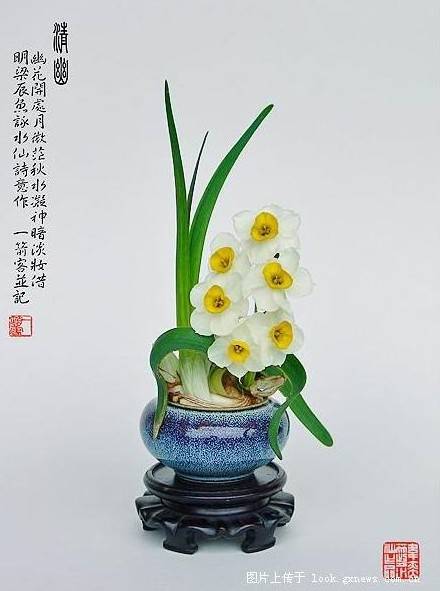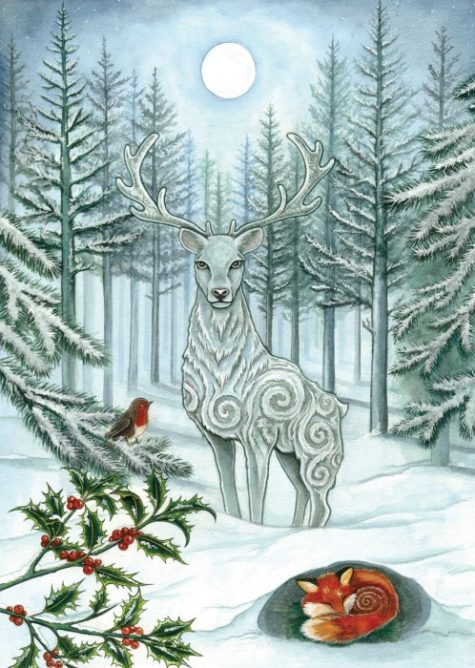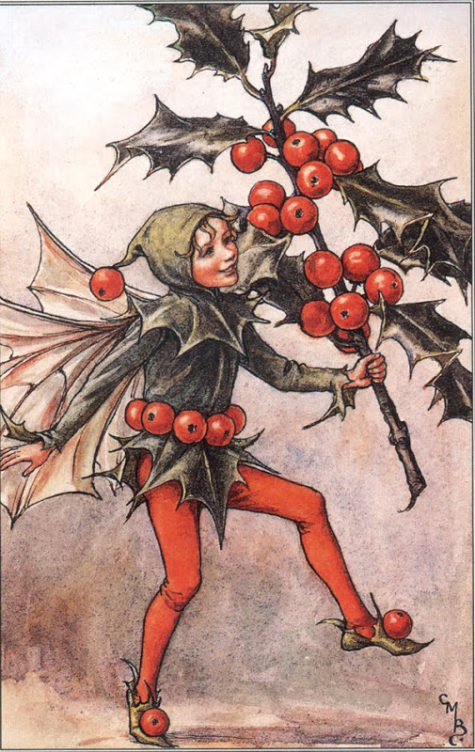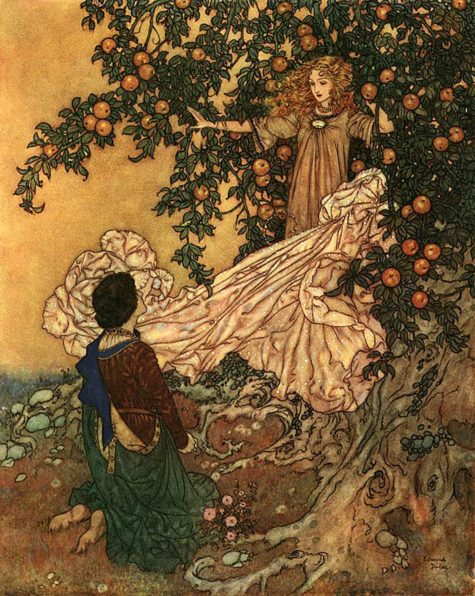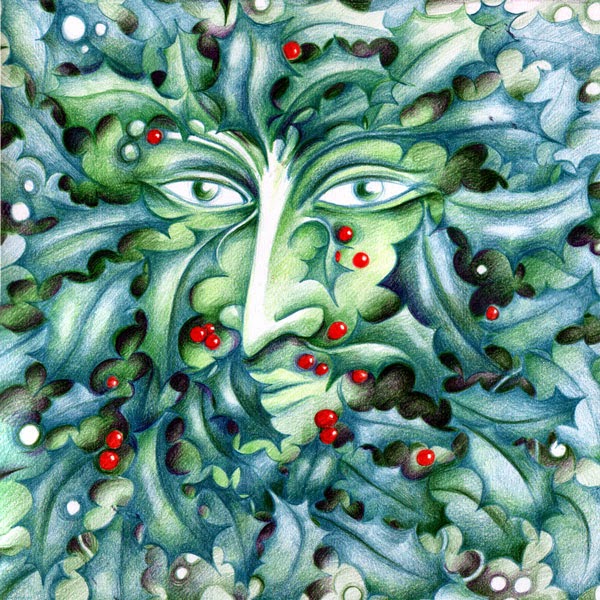Fairy
The Red Clover Fairy
White Clover Fairy
Sleepyhead
As I lay awake in the white moon light,
I heard a faint singing in the wood,
‘Out of bed,
Sleepyhead,
Put your white foot now,
Here are we,
Neath the tree
Singing round the root now!’
I looked out of window, in the white moon light,
The trees were like snow in the wood–
‘Come away,
Child, and play
Light with the gnomies;
In a mound,
Green and round,
That’s where their home is.
Honey sweet,
Curds to eat,
Cream and frumenty,
Shells and beads,
Poppy seeds,
You shall have plenty.’
But soon as I stooped in the dim moon light
To put on my stocking and my shoes,
The sweet sweet singing died sadly away,
And the light of the morning peeped through:
Then instead of the gnomies there came a red robin
To sing of the buttercups and dew.
– Walter de la Mare
Hello May
It’s May Eve!
Princess Edane… heard a voice singing on a May Eve like this, and followed half awake and half asleep, until she came into the Land of Faery, where nobody gets old and godly and grave, where nobody gets old and crafty and wise, where nobody gets old and bitter of tongue.
~William Butler Yeats, “The Land of Heart’s Desire,” 1894
Meadow Queen Fairy Song
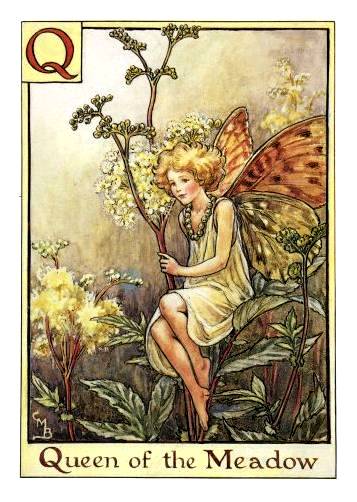 The Song of The
The Song of The
Queen Of The Meadow Fairy
Queen of the Meadow
where small streams are flowing,
What is your kingdom
and whom do you rule?
“Mine are the places
where wet grass is growing,
Mine are the people
of marshland and pool.
“Kingfisher-courtiers,
swift-flashing, beautiful,
Dragon-flies, minnows,
are mine one and all;
Little frog-servants who
wait round me, dutiful,
Hop on my errands
and come when I call.”
Gentle Queen Meadowsweet,
served with such loyalty,
Have you no crown to wear?
“Nothing I need
for a sign of my royalty,
Nothing at all
But my own fluffy hair!”
Story of the Sacred Lily
The “sacred lily” (Narcissus) that blooms at the Chinese New Year is the emblem of happiness, and whoever finds his lily blooming exactly on that day, is sure to be lucky. There is a legend connected with it that is more than a thousand years old.
Once there lived in China two orphan brothers. The eldest inherited the largest share of the ancestors’ estates and also wickedly seized the younger brother’s inheritance, leaving him only a few acres of rough, pebbly soil upon which nothing would grow. At one end of the ground was a marsh overgrown with rank weeds and rushes. For years the younger brother bore with magnanimous patience the rapacity of the eldest. Poverty and hunger at last broke him down. Overcome by despair he lay on the ground, sobbing and bemoaning his fate.
Suddenly he was aroused by a sweet voice calling his name. He looked up and beheld a beautiful fairy standing over him and bidding him rise, saying:
“Thy patience and forbearance have been seen by the gods and now there is a rich reward in store for thee. Lo! Where thy head has rested thou shalt find it beneath the soil. To reach it will be no easy task, but patient toil shall bring thee thy reward. Take courage then. Rest not till thou hast found, buried deep, that which shall give thee immortal fame, and make thee beloved and honored for a thousand generations.”
The fairy vanished, the rocky ground was still there, but hope possessed the young man’s soul. For many a day he dug and toiled. At last he found the promised treasure. It was nothing but a lily-bulb. With faith in the fairy’s promise he took it up, planted it, and nourished it until it grew into a flower, fairer than any that had ever been seen. Riches and honors came to him from the moment it began to bloom. Other bulbs sprang from its roots. His name and his story soon became famous.
Strange as it may seem, the lily would grow in no other part of China. Thousands came to him to buy this flower of wealth which has ever since borne the name of the Shuey Seen Fah, the flower of the water-fairy, and which has become the emblem of a happy New Year. To this day the only way to cultivate it, is on stones and rocks covered with water, in remembrance of its original rough and stony ground.
From: Encyclopaedia of Superstitions, Folklore and The Occult Sciences
A Winter Solstice Story for Children
A group of little Faeries huddled in their home deep under the roots of a giant oak tree. They were safe and snug in their tiny underground cave lined with dandelion fluff, bird feathers, and dried moss.
Outside, the wind blew cold and the snow fell softly down to cover the ground. “I saw the Sun King today,” the faerie named Rose said as she pulled her mossy cloak tighter about her. “He looked so old and tired as he walked off through the forest. What is wrong with him?
“The great oak said he’s dying” answered Daffodil.
“Dying? Oh, what will we do now?”, Little Meadow Grass started to cry, “If the Sun King dies, our little plant friends will not grow. The Birds will not come and sing again. Everything will be winter for ever!” Lilac, Dandelion and Elder Blossom tried to comfort their friend, but they were all very sad. As they huddled together, there was a knock on the tiny door.
“Open up, Faeries,” called out a loud voice. “Why are you hiding instead of joining us in our Solstice celebration?” Rose opened the door and the little gnome Brown Knobby pushed inside, shaking the glistening snowflakes off his brown coat and hat.
“We are too sad to celebrate,” Daffodil said wiping her eyes, “The Sun King is dying, haven’t you heard?”
“He is dead you silly Faeries.” Brown Knobby’s round dark eyes sparkled with laughter. “Now hurry, or we’ll be late for the celebration!”
“How can you be happy and laughing?!” Elder Blossom stamped her little foot and frowned at the gnome. “If the Sun King IS dead, it will be winter always. We will never see the Sun again!”
“Silly little child-Faeries.” Brown Knobby grabbed Dandelion by the hand and pulled her to her feet. “There is a secret to the Winter Solstice. Don’t you want to know what it is?”
The Song of the Holly Fairy
O, I am green in Winter~time,
When other trees are brown;
Of all the trees (So saith the rhyme)
The holly bears the crown.
December days are drawing near.
When I shall come to town,
And carol-boys go singing clear
Of all the trees (O hush and hear!)
The holly bears the crown!
For who so well-beloved and merry
As the scarlet Holly Berry?
Flower Fairies of the Winter,
Cicely Mary Barker
The Garden of Paradise
There was once a king’s son who had a larger and more beautiful collection of books than any one else in the world, and full of splendid copper-plate engravings. He could read and obtain information respecting every people of every land; but not a word could he find to explain the situation of the garden of paradise, and this was just what he most wished to know.
His grandmother had told him when he was quite a little boy, just old enough to go to school, that each flower in the garden of paradise was a sweet cake, that the pistils were full of rich wine, that on one flower history was written, on another geography or tables; so those who wished to learn their lessons had only to eat some of the cakes, and the more they ate, the more history, geography, or tables they knew. He believed it all then; but as he grew older, and learnt more and more, he became wise enough to understand that the splendor of the garden of paradise must be very different to all this. “Oh, why did Eve pluck the fruit from the tree of knowledge? why did Adam eat the forbidden fruit?” thought the king’s son: “if I had been there it would never have happened, and there would have been no sin in the world.” The garden of paradise occupied all his thoughts till he reached his seventeenth year.
One day he was walking alone in the wood, which was his greatest pleasure, when evening came on. The clouds gathered, and the rain poured down as if the sky had been a waterspout; and it was as dark as the bottom of a well at midnight; sometimes he slipped over the smooth grass, or fell over stones that projected out of the rocky ground. Every thing was dripping with moisture, and the poor prince had not a dry thread about him. He was obliged at last to climb over great blocks of stone, with water spurting from the thick moss. He began to feel quite faint, when he heard a most singular rushing noise, and saw before him a large cave, from which came a blaze of light. In the middle of the cave an immense fire was burning, and a noble stag, with its branching horns, was placed on a spit between the trunks of two pine-trees. It was turning slowly before the fire, and an elderly woman, as large and strong as if she had been a man in disguise, sat by, throwing one piece of wood after another into the flames.
“Come in,” she said to the prince; “sit down by the fire and dry yourself.”
“There is a great draught here,” said the prince, as he seated himself on the ground.
“It will be worse when my sons come home,” replied the woman; “you are now in the cavern of the Winds, and my sons are the four Winds of heaven: can you understand that?”
“Where are your sons?” asked the prince.
“It is difficult to answer stupid questions,” said the woman. “My sons have plenty of business on hand; they are playing at shuttlecock with the clouds up yonder in the king’s hall,” and she pointed upwards.
“Oh, indeed,” said the prince; “but you speak more roughly and harshly and are not so gentle as the women I am used to.”
“Yes, that is because they have nothing else to do; but I am obliged to be harsh, to keep my boys in order, and I can do it, although they are so head-strong. Do you see those four sacks hanging on the wall? Well, they are just as much afraid of those sacks, as you used to be of the rat behind the looking-glass. I can bend the boys together, and put them in the sacks without any resistance on their parts, I can tell you. There they stay, and dare not attempt to come out until I allow them to do so. And here comes one of them.”
James Cheney: Invocation To The Dark Mother
Daniel: Prayer Before The Final Battle
blessed obyno: Queen of Ghosts
blessed obyno: Queen of Ghosts
Caerlion Arthur: The Great, Bloody and Bruised Veil of the World
